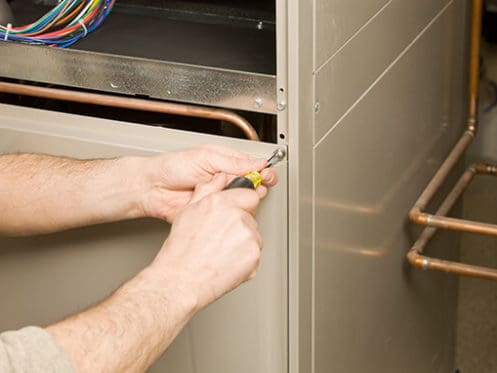It can be frustrating to try to decide between a gas and electric furnace. There’s a rating used by the Department of Energy to determine whether it’ll get an Energy Star certification. However, that doesn’t necessarily tell the whole story, especially if you’re trying to compare a gas furnace to an electric furnace in regard to efficiency. Let’s discuss the differences in furnace efficiency and answer the question that matters most: which will cost you less to run?
Gas and Electric AFUE Ratings
The standard measure for furnace efficiency is annual fuel efficiency utilization, or AFUE. This rating looks at the amount of fuel used to create heat compared to how much of that heat gets pushed out into your home.
Gas furnaces produce hot exhaust when fuel burns. This gas travels through the heat exchanger, warming the exterior of the exchanger tube, which in turn heats the circulating air. That exhaust has to vent from the system and your home, which takes with it some of the heat the unit produces. Standard single-stage furnaces have an AFUE rating of at least 80%, meaning that 80% of the heat produced goes to heating the air while 20% remains in the exhaust. High-efficiency modulating systems may have an AFUE rating as high as 98.5%, losing a mere 1.5% of heat through exhaust.
Electric furnaces work entirely differently. The efficiency is still rated using the AFUE concept. However, all-electric furnaces have a 100% AFUE rating because they don’t lose heat through exhaust. Rather, they use an electric resistance coil to produce heat, which transfers all of the heat into the air moving through the system. On the surface, this may make it seem like electric furnaces would be better than gas, since they always rate higher. However, that’s not always the case.
Cost Versus Efficiency
When we talk about heating efficiency across multiple kinds of units, the discussion usually comes down to operating costs. Homeowners are typically looking for an efficient option. The cost of fuel is a major consideration. Generally speaking, natural gas usually costs less than electricity. So much so that the slightly better efficiency rating doesn’t make up for the increased cost of electricity.
The Limitations of AFUE
AFUE is very helpful when trying to compare the relative efficiency between different models of gas furnaces. In these cases, all of the other heating efficiency variables should affect the system in about the same way.
However, when you’re dealing with electric heating, those other variables become more pronounced. Whereas the AFUE may be 100%, you may still expend more energy because of how the system runs and how much heat is delivered through the supply vents. There are six primary factors you’ll want to consider as you evaluate whether a gas or electric furnace may be right for your home.
6 Factors Affecting Efficiency
1. Temperature Rise
Temperature rise refers to how hot the air moving through the furnace gets compared to the air in your home. Generally speaking, gas furnaces generate more heat than electric resistance furnaces. As the air moves through your system, more hot air will come from your vents, raising your home’s temperature more quickly, thereby shortening the heating cycle length.
2. Duct Condition
The conditions of your air ducts play a huge role in your system’s operational efficiency. If your ducts are damaged or leaking, this will allow the heated air to leak out and cooler air to seep in.
When you consider the temperature rise, any leakage or seepage can make a massive difference in how well your unit heats your home. This difference will drive down your efficiency on any unit, but for electric units, it can make the system nearly ineffective. The solution is to have your ducts checked routinely and sealed about every 10 years.
3. Outside Temperature
The temperature outside can wreak havoc on any system, especially when frigid temperatures hit. However, during more moderate temperatures, operational efficiency may surprise you.
Basic gas furnaces utilize single-stage technology, which means when it’s cycling, it’s running on high. While this is helpful during the coldest days of the year, it may be overkill for the moderate temperatures that still require some heat. This is where an electric furnace may prove to be more efficient.
Higher-efficiency gas furnaces use modulating burners and variable-speed circulating fans, allowing the system to adjust the heating capacity it runs at in minute increments. This is why the highest-efficiency systems will run at better than 98% efficiency, nearing that of electric furnaces.
4. Your Home’s Insulation
How well your home contains heat is also an incredible determining factor in how your HVAC system works. The more heat it lets out, the more your system will have to work to keep it at the temperature you desire, regardless of what system you have.
However, just like issues with leaking ducts, electric furnaces will have more difficulty dealing with poor home insulation. Because the electric furnace produces less heat, it may struggle to make a leaky home comfortable and keep it at the desired temperature.
5. Your Home’s Size and Layout
Your home’s size and construction will determine how much heating capacity you need. However, how far the hot air needs to travel will impact how effective it is at heating your home. The longer the distance from the furnace, the cooler the air will become before entering a room, regardless of the type of furnace. However, when an electric furnace produces less heat, the air will be cooler at distant points from the furnace. If you have a long ductwork system, an electric furnace may not be ideal for you. However, in smaller spaces, an electric system may provide ample heating with better efficiency.
6. Is It Your Primary Heating Source?
Your furnace may not be your primary heating source, which is another big consideration. If you have an air-sourced heat pump, the furnace will only run during frigid temperatures. An electric heat furnace may be perfectly capable of keeping up with that usage. A gas furnace will still likely offer better overall operational efficiency compared to an electric one. However, the cost to install it may not make it worthwhile, driving up your overall annualized expenses.
The Bottom Line
As you can see, there isn’t a clear-cut answer as to whether a gas or electric furnace is more efficient. In some cases, an electric furnace may outperform a gas furnace, especially in moderate temperatures. However, in other cases, a gas furnace is going to cost considerably less to run. The best way to determine the most efficient option for your home is to work with a professional HVAC technician who has experience evaluating residential heating needs.
People around Metuchen have turned to First Choice Plumbing, Heating & Air Conditioning for their home service needs for more than 20 years. Our expert team provides air conditioning and heating installation, maintenance, and repair, together with a full range of plumbing services, including water heater service and indoor air quality solutions.
Call First Choice Plumbing, Heating & Air Conditioning to schedule a consultation with one of our NATE-certified technicians to explore whether an electric or gas furnace is right for your home.




